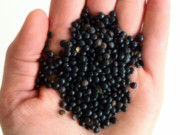Health Effects of Molybdenum: From Detoxifying Effects to Asthma Relief
Molybdenum (Mo), which was discovered by a Swedish scientist Carl Welhelm Scheele in 1778, is a frequently overlooked trace element that provides a number of health benefits. We obtain molybdenum from foods through our diet. As our bodies need only small amounts of molybdenum, deficiencies in this trace mineral are rare.

Good dietary sources of molybdenum include whole grains (particularly wheat germ), buckwheat, oats, legumes (especially green beans, lentils, peas, soybeans and lima beans), potatoes, dark green leafy vegetables (especially spinach), cauliflower, liver and other organ meats. If you are keen on learning about the health benefits associated with eating foods that contain molybdenum, continue reading. In this article we outline some of the most important health effects of molybdenum.
Molybdenum has a detoxifying effect on the body
The trace element molybdenum plays a key role in the formation/activation of aldehyde oxidase. Aldehyde oxidase helps detoxify acetaldehyde which is released as a by-product of yeast, fungi, and alcohol metabolism. Acetaldehyde is a toxic substance that may cause cancer. It also stresses the liver and kidneys and is thought to promote vitamin B deficiency. Furthermore, it inhibits the conversion of linoleic acid into gamma linolenic acid (GLA), an important anti-inflammatory fatty acid that helps fight numerous diseases and health conditions. Acetaldehyde levels are often pronounced in people who suffer from yeast infections (caused by the Candida albicans fungus) and who consume large amounts of alcohol.
Molybdenum may bring asthma relief
Molybdenum functions as a cofactor for sulfite oxidase (sometimes spelled 'sulphite oxidase'). Sulfite oxidase is an enzyme that assists in breaking down sulfite build-up in the body by transforming sulfites into harmless sulfates. Sulfites are chemicals that are used as preservatives to inhibit browning and discoloration of certain foods. In sulfite-sensitive people these chemicals can cause asthma symptoms that can range from wheezing to a potentially life-threatening asthma attack. In some cases, sulfites may also trigger other allergy-related symptoms such as itching, hives, fainting, and respiratory problems.
Molybdenum may help fight anemia in some cases
Molybdenum may help prevent anemia (anaemia) by helping mobilize iron, provided that your body has enough iron stored. Anemia, a relatively common condition especially in women, is characterized by a lack of healthy red blood cells. Red blood cells are responsible for carrying oxygen to different parts of the body. People who suffer from anemia commonly experience fatigue and short of breath. If you suspect you have anemia, you should see a doctor immediately as anemia may be a sign of another, more serious illness.
Other potential health effects of molybdenum
There are claims that molybdenum may also help prevent dental cavities (caries), certain mouth and gum disorders, and sexual impotence in men. However, these claims are not yet supported by definitive research.

